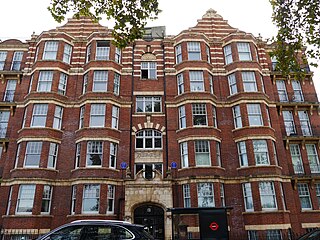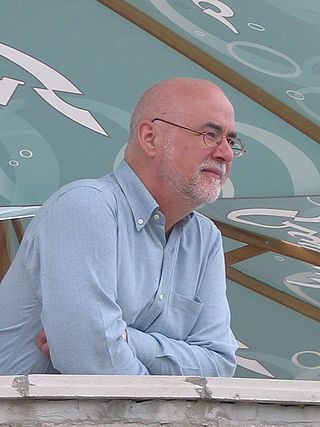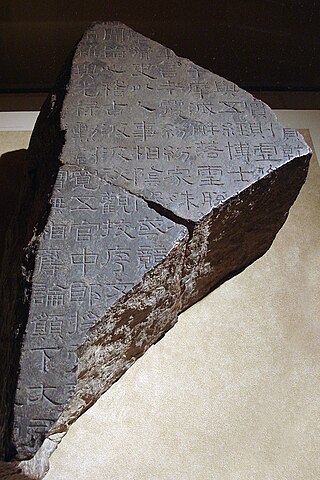
Classical Chinese poetry is traditional Chinese poetry written in Classical Chinese and typified by certain traditional forms, or modes; traditional genres; and connections with particular historical periods, such as the poetry of the Tang dynasty. The existence of classical Chinese poetry is documented at least as early as the publication of the Classic of Poetry (Shijing). Various combinations of forms and genres have developed over the ages. Many or most of these poetic forms were developed by the end of the Tang dynasty, in 907 CE.

In book publishing, an anthology is a collection of literary works chosen by the compiler; it may be a collection of plays, poems, short stories, songs, or related fiction/non-fiction excerpts by different authors.

Ali Ahmad Said Esber, also known by the pen name Adonis or Adunis, is a Syrian poet, essayist and translator. Maya Jaggi, writing for The Guardian stated "He led a modernist revolution in the second half of the 20th century, "exerting a seismic influence" on Arabic poetry comparable to T.S. Eliot's in the anglophone world."

Venus and Adonis is a narrative poem by William Shakespeare published in 1593. It is probably Shakespeare's first publication.

War poetry is poetry on the topic of war. While the term is applied especially to works of the First World War, the term can be applied to poetry about any war, including Homer's Iliad, from around the 8th century BC as well as poetry of the American Civil War, the Spanish Civil War, the Crimean War and other wars. War poets may be combatants or noncombatants.

Gavin Buchanan Ewart FRSL was a British poet who contributed to Geoffrey Grigson's New Verse at the age of seventeen.
Nationality words link to articles with information on the nation's poetry or literature.

Kenward Gray Elmslie was an American author, performer, editor and publisher associated with the New York School of poetry.
Nationality words link to articles with information on the nation's poetry or literature.
Nationality words link to articles with information on the nation's poetry or literature.
— closing lines of Rudyard Kipling's If—, first published this year

Gerrit Jan Komrij was a Dutch poet, novelist, translator, critic, polemic journalist and playwright. He rose to prominence in the early 1970s, writing poetry that sharply contrasted with the free-form poetry of his contemporaries. He acquired a reputation for his prose in the late 1970s, writing acerbic essays and columns often critical of writers, television programs, and politicians. As a literary critic and especially as an anthologist he had a formative influence on Dutch literature: his 1979 anthology of Dutch poetry of the 19th and 20th centuries, reformed the canon, and was followed by anthologies of Dutch poetry of the 17th and 18th centuries, of Afrikaans poetry, and of children's poetry. Those anthologies and a steady stream of prose and poetry publications solidified his reputation as one of the country's leading writers and critics; he was awarded the highest literary awards including the P. C. Hooft Award (1993), and from 2000 to 2004, he was the Dutch Dichter des Vaderlands. Komrij died in 2012 at age 68.

Christopher Whyte is a Scottish poet, novelist, translator and critic. He is a novelist in English, a poet in Scottish Gaelic, the translator into English of Marina Tsvetaeva, Pier Paolo Pasolini and Rainer Maria Rilke, and a critic of Scottish and international literature. His work in Gaelic appears under the name Crìsdean MacIlleBhàin.

Homoerotic poetry is a genre of poetry implicitly dealing with same-sex romantic or sexual interaction. The male-male erotic tradition encompasses poems by major poets such as Pindar, Theognis of Megara, Anacreon, Catullus, Virgil, Martial, Abu Nuwas, Michelangelo, Walt Whitman, Federico García Lorca, W. H. Auden, Fernando Pessoa and Allen Ginsberg. In the female-female tradition, authors may include those such as Sappho, "Michael Field", "Marie-Madeleine" and Maureen Duffy. Other poets wrote poems and letters with homoerotic overtones toward individuals, such as Emily Dickinson to her sister-in-law Susan Huntington Gilbert.

Susie Frances Harrison née Riley was a Canadian poet, novelist, music critic and music composer who lived and worked in Ottawa and Toronto.
Diann Blakely was an American poet, essayist, editor, and critic. She taught at Belmont University, Harvard University, Vanderbilt University, led workshops at two Vermont College residencies, and served as senior instructor and the first poet-in-residence at the Harpeth Hall School in Nashville, Tennessee. A "Robert Frost Fellow" at Bread Loaf, she was a Dakin Williams Fellow at the Sewanee Writers' Conference at which she had worked earlier as founding coordinator.

Han poetry as a style of poetry resulted in significant poems which are still preserved today, and whose origins are associated with the Han dynasty era of China, 206 BC – 220 AD, including the Wang Mang interregnum. The final years at the end of the Han era often receive special handling for purposes of literary analysis because, among other things, the poetry and culture of this period is less than typical of the Han period, and has important characteristics of its own, or it shares literary aspects with the subsequent Three Kingdoms period. This poetry reflects one of the poetry world's more important flowerings, as well as being a special period in Classical Chinese poetry, particularly in regard to the development of the quasipoetic fu; the activities of the Music Bureau in connection with the collection of popular ballads and the resultant development of what would eventually become known as the yuefu, or as the rhapsodic formal style; and, finally, towards the end of the Han dynasty, the development of a new style of shi poetry, as the later development of the yuehfu into regular, fixed-line length forms makes it difficult to distinguish in form from the shi form of poetic verse, and at what point specific poems are classified as one or the other is somewhat arbitrary. Another important poetic contribution from the Han era is the compilation of the Chuci anthology, which contains some of the oldest and most important poetic verses to be preserved from ancient China, as well as the transmission of the Shijing anthology.

Qing poetry refers to the poetry of or typical of the Qing dynasty (1644–1911). Classical Chinese poetry continued to be the major poetic form of the Qing dynasty, during which the debates, trends and widespread literacy of the Ming period began to flourish once again after a transitional period during which the Qing dynasty had established its dominance. Also, popular versions of Classical Chinese poetry were transmitted through Qing dynasty anthologies, such as the collections of Tang poetry known as the Complete Tang Poems and the Three Hundred Tang Poems. The poetry of the Qing Dynasty has an ongoing and growing body of scholarly literature associated with its study. Both the poetry of the Ming dynasty and the poetry of the Qing dynasty are studied for poetry associated with Chinese opera, the developmental trends of Classical Chinese poetry and the transition to the more vernacular type of Modern Chinese poetry, as well as poetry by women in Chinese culture.

Sergey Davidovich Izgiyayev was a member of the Union of Soviet Writers, the author of nine books of poetry and five plays, the translator and creator of lyrics for more than thirty songs. He was of Mountain Jew descent.
Sunflower Splendor: Three Thousand Years of Chinese Poetry is an anthology of around 1,000 Chinese poems translated into English, edited by Wu-chi Liu and Irving Yucheng Lo and published in 1975 by Anchor Press/Doubleday. Wu-chi Liu served as the anthology's senior editor. As of 2002, the book had been widely used in Asian literature studies. In 2002 Stacy Finz of the San Francisco Chronicle wrote that the book "was a best-seller".














